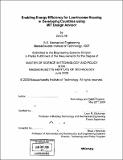Enabling energy efficiency for low-income housing in Developing countries using MIT Design Advisor
Author(s)
Ali, Zehra (Zehra Hyder)
DownloadFull printable version (42.97Mb)
Other Contributors
Massachusetts Institute of Technology. Technology and Policy Program.
Advisor
Leon R. Glicksman.
Terms of use
Metadata
Show full item recordAbstract
There is a great need to improve energy efficiency of low-income housing, since people who can afford it least have to pay a significant portion of their income to make their homes more habitable or else live with greater health and environmental risks. One of the main barriers to improving energy efficiency in low-income housing is the lack of awareness regarding design choices and their associated externalities. Thus to enable better design decision-making, MIT Design Advisor, a rapid and simple building energy simulation tool, has been adapted to make the costs of poor housing energy efficiency more obvious and the benefits through simple design improvements more understandable and comparable. Through the use of this tool decision makers would be provided with a platform to investigate different design concepts and prioritize energy efficiency improvements for low income housing without having to spend time and money in hiring experts or conducting a pilot study. Also, a framework to engage different stakeholders past the design process towards implementing these recommendations has also been presented.
Description
Thesis (S.M. in Technology and Policy)--Massachusetts Institute of Technology, Engineering Systems Division, Technology and Policy Program, 2009. Includes bibliographical references (p. 102-107).
Date issued
2009Department
Massachusetts Institute of Technology. Engineering Systems Division; Technology and Policy ProgramPublisher
Massachusetts Institute of Technology
Keywords
Engineering Systems Division., Technology and Policy Program.